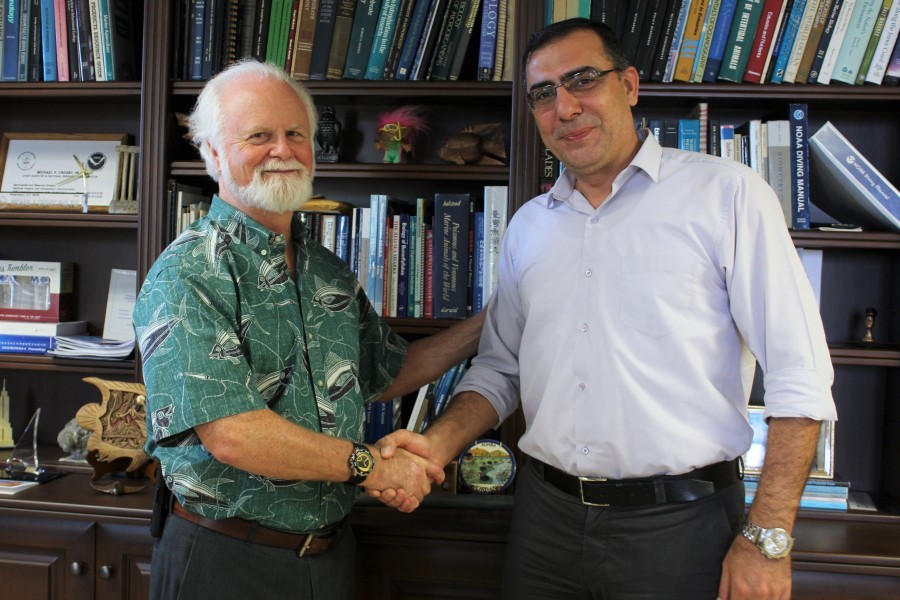Mote welcomes Jordanian Fulbright Scholar studying coastal lagoons

Mote President & CEO Dr. Michael P. Crosby and Jordanian Fulbright Scholar Dr. Riyad Manasrah. Credit: Mote Marine Laboratory
Mote Marine Laboratory is pleased to welcome Dr. Riyad Manasrah, recipient of a prestigious Fulbright Visiting Scholar Award from the Middle Eastern nation of Jordan.
Manasrah will investigate the physical and chemical dynamics of coastal ocean lagoons in the northern Gulf of Aqaba, Red Sea, to determine environmental status and threats to these critical ecosystems, as well as options and recommendations for sustainable use of such systems through his Fulbright award spanning September 2018 through May 2019.
“Coastal lagoons are of extreme importance for life in the sea,” Manasrah said. “They are among the most productive ecosystems and are home for many species. They also support a range of natural services that are highly valued by society, including fisheries productivity, storm protection, tourism and others. Artificial lagoons provide and increase coastline used for different aspects of development in terms of tourism, investments and economy. On the other hand, coastal lagoons suffer from excessive nutrient loadings that can play a role in phytoplankton blooms and other adverse effects. Artificial lagoons in the Jordanian Gulf of Aqaba were established due to the limited access and availability of Jordanian coastline, which is only 16.7 miles (27 kilometers) long. This kind of intensive development might negatively impact the natural environment and ecosystem of this coastal area.”
Manasrah’s study aims to investigate the environmental interaction between lagoon and open sea for different designs of the existing lagoons along the Jordanian coast. Dynamical processes and physical characteristics as well as chemical properties will be studied and analyzed to reveal the environmental status and threats, as well as provide options for mitigation of any problems that might directly or indirectly impact the region.
“Dr. Manasrah and I first began our professional interaction over 10 years ago as an outgrowth of my earlier engagement in leading the USAID and Department of State-supported Red Sea Marine Peace Park Cooperative Research, Monitoring and Resource Management Program,” said Dr. Michael P. Crosby, President & CEO of Mote. “Since then I have been impressed with his professional and academic accomplishments, and I believe they only scratch the surface of what he will be able to achieve as a Fulbright scholar here at Mote.”
Manasrah is a Full Professor of physical oceanography at the University of Jordan/Aqaba (JU-Aqaba), where, prior to his arrival at Mote, he was the President Assistant of JU-Aqaba and Director of the Marine Science Station, both in Aqaba, Jordan. His research interests center on physical oceanography, specifically on: deep and coastal water circulation; waves, tides and shallow-water physical processes; air-sea interaction and the annual variation of heat flux and heat storage; characteristics of water masses; and observation of physical properties of coastal marine ecosystems.
His research has included: monitoring the environmental quality of the Jordanian coast of the Gulf of Aqaba through a National Monitoring Program since 2001; investigating El-Nino and past climate variability recorded in corals from the northern Gulf of Aqaba during 2003-2008; working with the Red Sea Marine Peace Park in 2004-2006; working and investigating with a consortium of international institutions the EIA of Red Sea – Dead Sea water conveyance on the Gulf of Aqaba during 2010-2011; studying and Managing the Environmental Sustainability of Ports for a durable development during 2012-2015; and many more projects – notably with a focus on protecting the Gulf of Aqaba from human impacts.
“I am pleased that Dr. Manasrah will be working alongside our team at Mote, as part of Mote’s international marine science diplomacy initiative,” Crosby said. “His research on coastal marine lagoons will translate to a better understanding and sustainable use of Jordan’s limited yet extremely important marine environment and resources, as well as similar resources elsewhere in the world.”